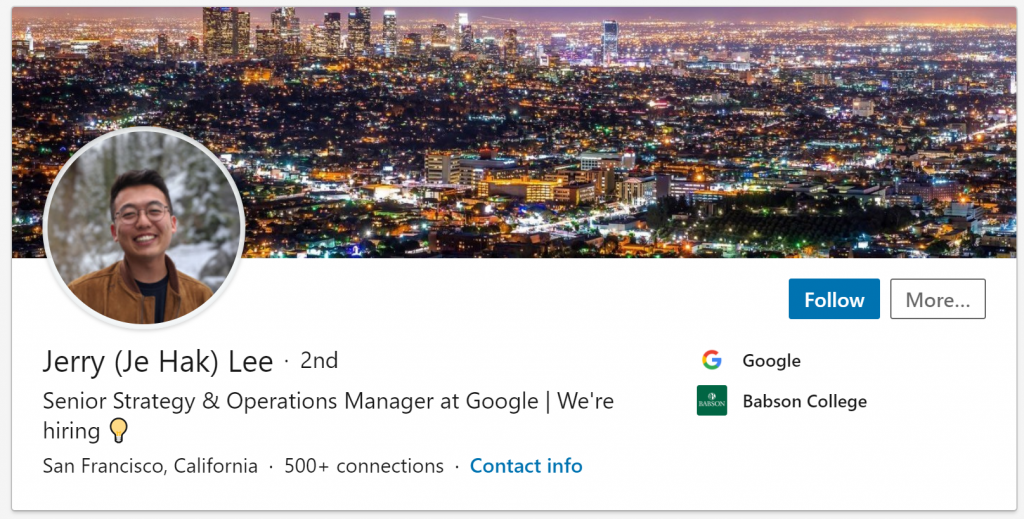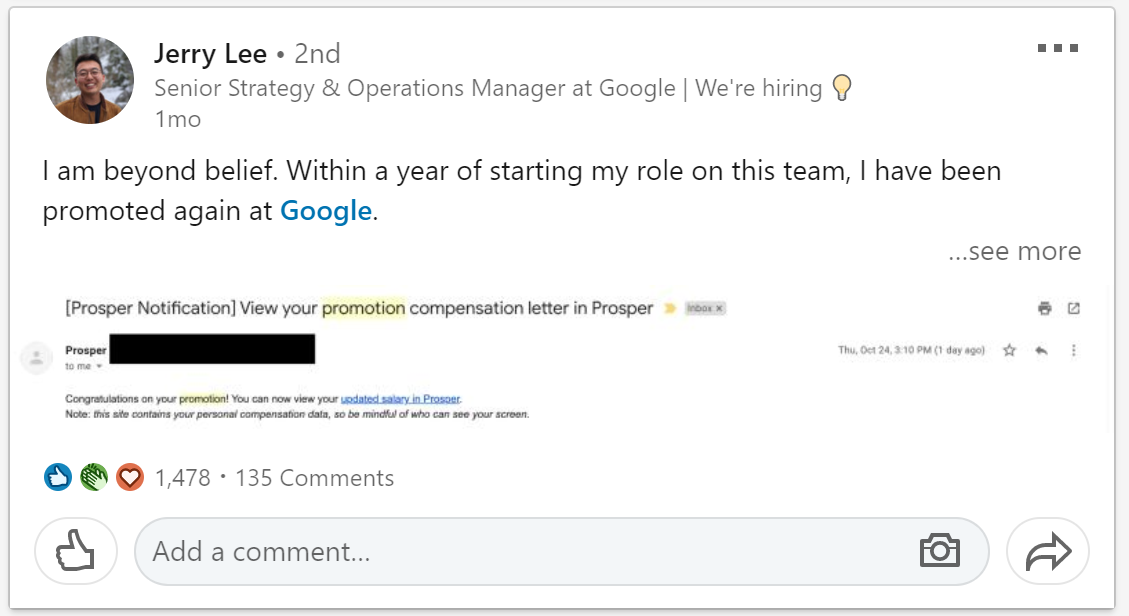You’ve been promoted at Google twice in the past two years at the company. What are you doing differently?
“[There are two things I’ve noticed in my career.] One is just being proactive. It’s not that I’m waiting there, twiddling my thumbs, hoping that someone will give me a project, or hoping that someone will tell me what to do – but rather it’s me saying, ‘You know what, if no one’s going to give me a project, then I’m just going to find one and create one myself.’
So really, it’s being proactive, trying to find business problems that affect your leadership. And more importantly, making sure that you get visibility when you’re tackling these problems, making sure you’re ultimately getting rewarded at the end of the project.
And the second is taking ownership. And I think this is a buzzword people typically throw around in the professional environment, but taking ownership in my mind is: if something fails, you are held responsible for it; if something succeeds, you are rewarded for it. But also that if someone isn’t doing their job, you are there to pick it up and make sure that you run through with it because you own it. And it’s very similar to running a business – it’s that whatever is what people don’t want to do, you just have to do it because you’re the owner.”
How are your managers measuring your success when promoting you?
“I think in a strategy role, it typically is more about the softer skills than it is the actual hard skills. I would imagine salespeople and software engineers are able to say, ‘I was able to push this much revenue. I was able to build this specific product within this timeframe and use impact metrics.’ But in our world, I think if I were able to prioritize the two things you’re measured against, one would be: how well are you able to execute? And the second is, what is the output?
Often times, it’s all about positioning. You could have a completely failed project, and on one end of the spectrum, you could say, ‘Wow, that was a complete failure, we didn’t get things done. It was completely bad,’ and you could take it as a negative thing. But on the opposite side, you could shift the optics and say, ‘You know what? We were able to find an area of opportunity that we looked into. We learned a ton from it – we’re not going to pursue it, but this will help inform other investment decisions that we make moving forwards.’
And not just [about] being able to articulate value, but also being able to get to that answer with everyone on your side, as opposed to you stepping on everyone’s toes and executing the project. And even if it is a failed project, making sure that your peers still vouch for you, that your peers still like working with you – that when you’re not in the room, that they’re speaking very highly of you.
[When we’re talking about hiring or promoting,] it all comes down to soft skills. It’s not the person who can churn out the analyses the quickest, not the person who can write the fastest lines of code, but it’s all about whether or not they can get the job done, that they feel like they have the ownership that we’re talking about – more importantly, they’re probably just go-getters. They just get the work done, no matter what the challenges are, and they figure it out.”
Do you think your cultural background plays a role in how successful you are in a corporate job?
“I think that this is a topic that isn’t being talked about enough, but is extremely relevant. There’s this concept called the ‘bamboo ceiling.’ It’s this idea that people who come from an Asian culture or Asian background are able to do well – to become a great entry-level position holder in a lucrative field, like a software engineer. This idea of bamboo ceiling really says that even though on the first layer of statistics you may see that Asians are doing really well, there’s actually a significant minority of Asian leaders represented in large corporations across the world.
And so the question is, ‘Why does that happen?’ I think the majority of that has to do with your Asian culture and the way that you’re brought up. Traditionally, at least in the Korean culture, you’re not told to disagree with your elders – rather, you’re told to obey. And you’re told to blindlessly follow, even if you disagree. So much of what you would expect from a traditional Western leader – of having their own strong opinion, being to overcome any boundaries, and all that – I think is very different from what you would grow up learning in a traditional Asian household.
As I was developing my career, one of the biggest things I had to overcome was the thought that my manager isn’t always right. That I need to have my own perspective, and once I have my own perspective, then my manager and I can talk about whether or not we disagree or agree; then we find a path and move forward. Rather than, my manager has a point of view, he is more experienced than me, thus I agree with him, thus I move forward. And I think that’s one of the ways culture manifests, at least from your childhood into your professional career.”
What advice would you give to a young college student or graduate looking to jumpstart their career?
“As I look back, one of the things I always think about is: you should always let passion drive your path forward, rather than the traditional definition of success.
My parents always pushed school onto me, to the point where I didn’t have a great relationship with my parents during middle school or high school. One of the things I wished that my parents pushed more, was saying, ‘You know what? If you’re passionate about playing video games, and you think you’re really good, and you think you could make it, just go for it.’
At the end of the day, what I’ve learned is that no matter what your passion is, as long as you’re putting all you energy into it, and as long as you’re moving forward, everything else will come. Everything else will come forward with it – that be it money, that be it the skill, whatever opportunities.
One of the things I wish I didn’t give up, that I did give up, was playing professional eSports. Look at the way eSports has transitioned today: if you’re good, it can be extremely lucrative. I was like, dang – if I had continued on that path, pursuing my passion for video games, starting to stream on Twitch and all that? I really wonder how different my career path could have been. That being said, I love where I am today – I have no regrets, but I am always wondering if I had progressed in the eSports team I was in, how far would we have gone?”




